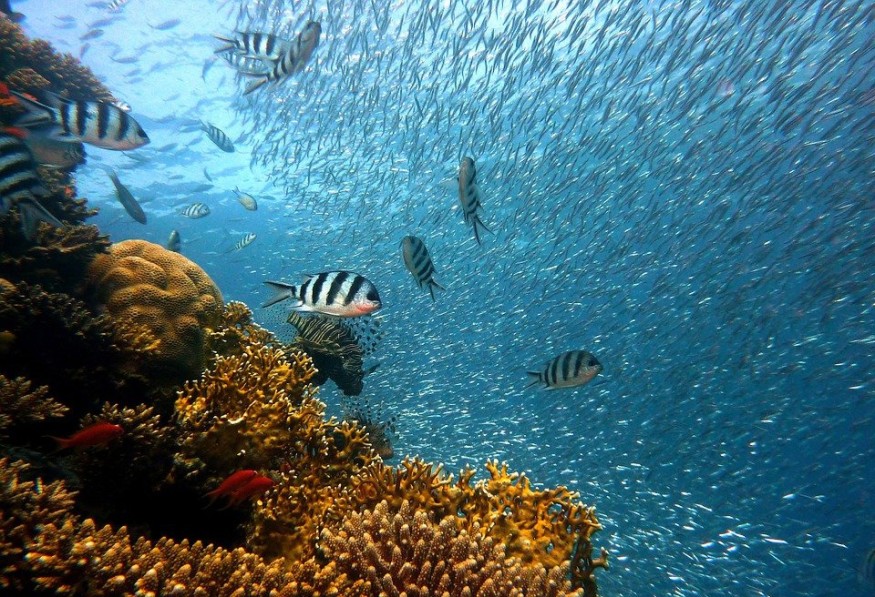There is an urgent need for sustainable ocean management to address food security, biodiversity, and climate change and improve the economy. An ongoing review of the threats and opportunities for the ocean was made by the Ocean Panel, or the High-Level Panel for a Sustainable Ocean Economy, starting in 2018. It is a 14-country panel led by Palau and Norway.
It takes a holistic approach regarding what a healthy ocean can deliver and found that if 30% of the ocean is effectively protected, it can reduce 20% of the required decrease in carbon emissions set by the Paris Climate Agreement to lower temperatures to 1.5 °C above levels before pre-industrial times.
It can also deliver renewable energy 40 times more compared to the amount produced in 2018; 12 million more jobs; six times higher amounts of sustainable seafood; and a net benefit of 15.5 trillion US dollars.

READ: River Pollution from Plastic Fishing Gear Threatens Ganges River Wildlife
The Panel
To attain these benefits, five areas of policy action priority have been identified by the Ocean Panel. It is composed of world leaders that can initiate worldwide action. It comprises Norway, Palau, Australia, Chile, Canada, Fiji, Indonesia, Ghana, Jamaica, Kenya, Japan, Mexico, Portugal, and Namibia. It is also supported by the UN Sec-Gen Special Envoy for the Ocean.
These leaders manage almost 40 percent of our planet's coastlines, almost 30 percent of exclusive economic zones, 20 percent of shipping fleets, and 20 percent of fisheries all over the world.
READ ALSO: Albatross and Petrels: Intentionally Killed and Mutilated by Fishermen in Southwestern Atlantic
The five priorities
The Panel found that investing in these five priorities will address environmental challenges, create jobs, benefit economies, and protect our people and our planet. They are enumerated below.
Sustainable seafood production
Sustainable mariculture and fisheries could produce 36 to 74 percent more harvests by 2050 that meet the extra 12 to 25 percent required meat.
Required policy reforms include eliminating unregulated, illegal, and unreported fishing and prohibiting harmful subsidies on fisheries. Plans must be made to replenish stocks and develop climate-ready fisheries.
International fisheries management groups must be strengthened. Environmental impacts must be minimized, and sustainable mariculture practices accelerated.
Climate change mitigation
Renewables for generating power can be ocean-based, such as wind, tidal, wave, current, solar, and thermal power. Panel leaders pledged to research, develop and demonstrate cost-competitive, sustainable, and accessible technologies and projects.
Shipping should be decarbonized. Panel leaders will set strategies and targets to adopt and develop technologies to produce and store fuels with zero emissions. Low-carbon ports are needed, and International Maritime Organization regulations should be strengthened. Aquatic invasive species transfer by ships should be minimized, engine noise is reduced, and Arctic heavy fuel oil is banned.
Part of the agenda is to halt the degradation of mangrove, seagrass, and salt marsh ecosystems and improve their condition and extent.
Stopping the loss of biodiversity
The Panel identified overharvesting of marine organisms as the largest single biodiversity threat, and effective MPAs or marine protected areas can halt this loss. Careful planning, designing, and enforcement are needed.
Seizing economic opportunities
The Panel identified five economic areas that can be taken advantage of. These are the following: 1) restoration of marine and coastal ecosystems to enhance fisheries, carbon sequestration, and tourism and create jobs; 2) extending wastewater and sewage infrastructure to improve health, create jobs, improve water quality, and enhance tourism; 3) investing in non-fed, community-led, and sustainable mariculture to enhance livelihoods and economies and improve food security; 4) enhancing incentives that encourage zero-emission ocean transportation, and 5) investing in renewables that are ocean-based.
Holistic ocean management
This involves integrated and ecosystem-based ocean management. It needs all stakeholders' involvement, requires clear goals, should be inclusive, and have proper funding.
Reaching the goal
Effective protection, sustainable production, and equitable prosperity require smart ocean use, greater efficiency, and ongoing scientific and technological improvements. It needs caution, heeding the past lessons to ensure the welfare of everyone, and guarantee ecosystem health.
With science and equity as guides, sustainable ocean management will benefit people and nations, address food security, improve the economy, enhance biodiversity, and mitigate climate change.
Check out more news and information on Coral Reefs on Nature World News.
© 2025 NatureWorldNews.com All rights reserved. Do not reproduce without permission.





